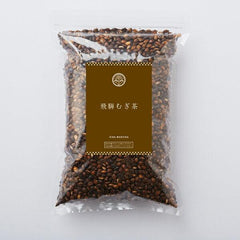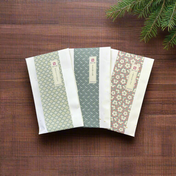What is Roasted Barley Tea?
Roasted barley tea, also commonly referred to as “mugicha,” is a popular beverage in Japan. Even though it is referred to as tea, it does not actually contain any tea leaves. Rather, it is an infusion of unhulled barley grains and water, an herbal tea. The barley grain is roasted before steeping and enjoyed hot or cold. Mugicha has a rich, nutty flavor and is very budget-friendly. The roasted grain is also caffeine free and is often sold as a substitute for coffee.
 Shop Nabeshima Hida Mugicha Barley Tea in loose grain
Shop Nabeshima Hida Mugicha Barley Tea in loose grain
In the past, it has always been sold as a loose grain. However, today you can find tea bags and bottled drinks as well. Due to its hydrating properties, this drink is an especially popular summertime favorite in Japan. In other words, Mugicha is a symbol of summertime in every Japanese household. A Japanese friend of mine once compared the preparation of mugicha to more famous traditional Japanese tea ceremonies. He said its place in Japanese summertime is of as much cultural relevance as the tea ceremonies tourists associate with traditional Japanese culture. For many Japanese people, roasted barley tea is the taste of summer!
How to Brew
 Shop Organic Roasted Barley Tea from Ishikawa Prefecture in Tea Bags
Shop Organic Roasted Barley Tea from Ishikawa Prefecture in Tea Bags
The tea bags are typically designed to be cold brewed. Cold brewing is the easiest way to prepare the tea. Simply toss a tea bag in some cool water and refrigerate. The exact water to tea recommendation should be printed on your package but, in general, a 1:4 ratio is a good starting point. You can always experiment with quantities to suit your own style. Cold brewing methods tend to produce a lighter color and a more subtle taste.
Alternatively, roasted barley tea can also be sun-steeped. Sun teas have been popular in warm climates for many years but they can also work in cooler climates on warm, sunny days. To make sun tea simply place a tea bag in a pitcher of water, cover with plastic wrap, and set in a warm, sunny place for several hours.
While the Japanese enjoy drinking their roasted barley tea chilled, Korean and Chinese people tend to prefer it warm. Simply boil some water simmer the tea for several minutes. Serve hot. Sometimes the roasted barley is combined with roasted corn for a more complex flavor.
 Shop Organic Hato Mugicha from Ishikawa Prefecture in Tea Bags
Shop Organic Hato Mugicha from Ishikawa Prefecture in Tea Bags
Mugicha can be sweetened to taste or served as-is. Its toasty flavour is complemented well by lemon or honey. Recently, some individuals have been mixing the barley with tea leaves, allowing the beverage to be both cold brewed or simmered.
Roast Your Own!
If you’ve been bitten by the D-I-Y bug, or don’t have access to mugicha, you can make your own! Proper mugicha is made from unhulled barley grains however, this may be difficult to find in your local grocery store. When in a pinch, one can substitute the unhealed grains with normal pearl barley for this recipe.
Homemade Japanese Mugicha Recipe (Makes 10 cups)
Ingredients
- 1/2 cup uncooked pearl barley
- 10 cups water
Directions
- Place the uncooked barley in a large, nonstick skillet and roast over medium heat for 10 minutes. While toasted, shake the grains occasionally so they are evenly cooked.
- Stop when all the grains are an even, dark brown. Remove from heat and place evenly on a plate or paper towel to cool.
- Boil water in a medium size pot. Once fully boiling, add the toasted barley. Be sure the barley is has cooled down before adding it to the pot. Simmer for 20-25 minutes.
- After boiling, allow the tea to steep for 7 more minutes, allowing the infusion to cool.
- Strain the barley and pour the fresh mugicha into a glass pitcher. Allow the mugicha to chill in the refrigerator for several hours before enjoying.
Precautions
Pregnant or breastfeeding women should avoid barley tea as it may inhibit lactation. In addition, as this grain contains gluten, those with gluten intolerance are advised to avoid this tea.
If you’re trying to kick a caffeine habit, roasted barley tea is the perfect healthy alternative to coffee. Feel free to snack on the grains after you’ve finished steeping your tea, whole grains are packed with fiber and promote healthy stomach bacteria. It’s a great nutritional supplement and is the perfect addition to a healthy diet. Experience the taste of summertime in Japan!

